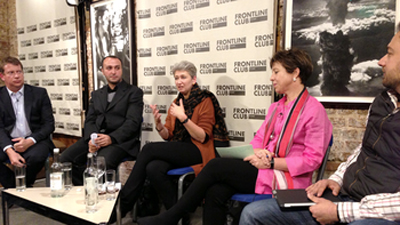Covering poverty in an indifferent world
In 1984 the world was shaken by the images of the famine in Ethiopia, described by Michael Buerk in his report for the BBC as “a biblical famine in the 20th Century” what followed was a global call to action. Live Aid organised by Bob Geldof and Midge Ure reached an estimated global audience of 1.9 billion and raised £150 million.
The images of the famine in Ethiopia were shocking, but nearly 30 years on, is the public immune to graphic imagery? How do you communicate poverty in the modern media landscape?
Much criticism has been levelled at Live Aid but there is no doubt that it galvanised a generation in a way that has not been done since. Join us as we discuss whether a message on poverty can harness global attention in a world more connected than ever before, and what the role of public figures should be.
Chaired by Paddy Coulter, a specialist in media and development with over 25 years professional experience. He is director of communications at the Oxford Poverty & Human Development Initiative (OPHI) at Oxford University’s Department of International Development, he previously worked as Director of Studies at the Reuters Institute for the Study of Journalism.
With:
Jamie Drummond, co-founder and Executive Director of ONE, a grassroots advocacy and campaigning organisation that fights extreme poverty and preventable disease, particularly in Africa, by raising public awareness and pressuring political leaders to support smart and effective policies and programs.
Andrew Hogg, head of media at Christian Aid. Previously he was news editor of The Sunday Times and the Observer, and he was editor of The Sunday Times Insight investigative unit. He was also that paper’s Africa and Middle East correspondent.
Paul Vallely, a writer and activist on Africa and development issues. He is an associate editor of The Independent where he writes about ethical, cultural and political issues. He was the The Times correspondent in Ethiopia during the great famine of 1984/5. Vallely ghost-wrote Bob Geldof’s autobiography, Is That It? in 1985 and travelled with Geldof across Africa to decide how to spend the £100m raised by Live Aid. He was later involved in the organisation of Live 8.
Lilie Chouliaraki, Professor of Media and Communications at LSE. She has published extensively on the mediation of suffering, including the books The Spectatorship of Suffering, The Soft Power of War and The Ironic Spectator.


